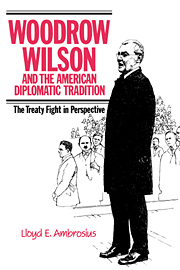Book contents
- Frontmatter
- Contents
- Preface
- Acknowledgments
- List of abbreviations
- 1 Introduction: Wilson's new world
- 2 Origins of Wilson's league of nations idea
- 3 Drafting of the League of Nations Covenant
- 4 American criticism of Wilson's peacemaking
- 5 Revision of the League of Nations Covenant
- 6 The question of control at home and abroad
- 7 The Versailles Treaty in the Senate
- 8 American rejection of the Versailles peace
- 9 The aftermath of Wilson's peacemaking
- 10 Epilogue: Wilson's legacy
- Bibliography
- Index
7 - The Versailles Treaty in the Senate
Published online by Cambridge University Press: 18 September 2009
- Frontmatter
- Contents
- Preface
- Acknowledgments
- List of abbreviations
- 1 Introduction: Wilson's new world
- 2 Origins of Wilson's league of nations idea
- 3 Drafting of the League of Nations Covenant
- 4 American criticism of Wilson's peacemaking
- 5 Revision of the League of Nations Covenant
- 6 The question of control at home and abroad
- 7 The Versailles Treaty in the Senate
- 8 American rejection of the Versailles peace
- 9 The aftermath of Wilson's peacemaking
- 10 Epilogue: Wilson's legacy
- Bibliography
- Index
Summary
Neither Wilson nor his Republican foes evidenced any willingness to compromise their fundamental differences. The question of control continued to separate them as the Senate undertook formal action on the Versailles Treaty. The Foreign Relations Committee recommended amendments and reservations, but the president rejected any changes. Ironically, the rigidity of his all-or-nothing stance reflected his growing awareness that the United States could not influence the myriad patterns of international relations in the way he hoped. Voicing his despair to Lansing, he revealed that he was considering withdrawal of the United States from the League because of the selfish conduct of other nations. Wilson asserted that “when I think of the greed and utter selfishness of it all, I am almost inclined to refuse to permit this country to be a member of the League of Nations when it is composed of such intriguers and robbers. I am disposed to throw up the whole business and get out.” Becoming increasingly aware of the limits of American power in the postwar world, he adjusted to this reality by holding more inflexibly to his ideals. Rather than attempt to define a constructive, but inherently frustrating, foreign policy that might win the Senate's support and contribute to postwar reconstruction, he preferred his dream of global leadership. He held firmly to his vision of collective security and refused to accept a more limited, but definite, role for his country in the interdependent and plural world.
- Type
- Chapter
- Information
- Woodrow Wilson and the American Diplomatic TraditionThe Treaty Fight in Perspective, pp. 172 - 210Publisher: Cambridge University PressPrint publication year: 1987



